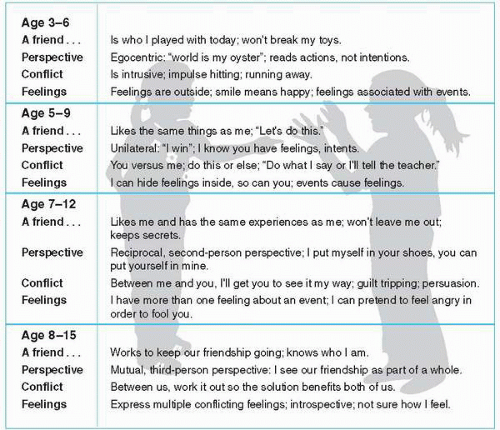Peers and Social Development
Learning to negotiate peer relationships is central to social development in childhood and for later in life.
Children’s concept of friendship changes as they are able to take someone else’s point of view, called a second-person perspective, and to understand how it is similar to and/or different from their own.
Social cognition is the ability to read a social situation and to act accordingly. It is related to social skills such as conflict resolution.
The term playground politics refers to how children negotiate the complex structure of the peer group, which involves competition, shifting alliances, and conflict, as well as cooperation and trust.
TERMS
Egocentric
Second-person perspective
Social cognition
Unilateral
While the attitude of younger children is “The world is my oyster,” school-age children believe that “The world is other kids.” Peers are central to children’s development. Whereas their relationships with adults and with children younger and older than themselves are vertical in nature and reflect a hierarchy of experience and authority, their relationships with peers are more horizontal. Peers may not be equal in ability or expertise or the same age. Nevertheless, they are of roughly equal status in the give-and-take of a relationship, the context for development of social and moral reasoning.
How children think about themselves and friendships is related to cognitive development, and to the ability to take someone else’s point of view (Selman & Schultz, 1991) (Figure 50-1).
 Figure 50-1 Stages of Social-Emotional Development
Stay updated, free articles. Join our Telegram channel
Full access? Get Clinical Tree
 Get Clinical Tree app for offline access
Get Clinical Tree app for offline access
Get Clinical Tree app for offline access

|